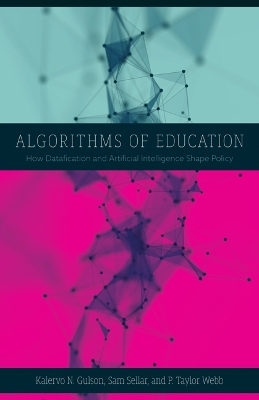
Algorithms of Education
University of Minnesota Press (Verlag)
978-1-5179-1024-2 (ISBN)
While the science fiction tales of artificial intelligence eclipsing humanity are still very much fantasies, in Algorithms of Education the authors tell real stories of how algorithms and machines are transforming education governance, providing a fascinating discussion and critique of data and its role in education policy.
Algorithms of Education explores how, for policy makers, today’s ever-growing amount of data creates the illusion of greater control over the educational futures of students and the work of school leaders and teachers. In fact, the increased datafication of education, the authors argue, offers less and less control, as algorithms and artificial intelligence further abstract the educational experience and distance policy makers from teaching and learning. Focusing on the changing conditions for education policy and governance, Algorithms of Education proposes that schools and governments are increasingly turning to “synthetic governance”—a governance where what is human and machine becomes less clear—as a strategy for optimizing education.
Exploring case studies of data infrastructures, facial recognition, and the growing use of data science in education, Algorithms of Education draws on a wide variety of fields—from critical theory and media studies to science and technology studies and education policy studies—mapping the political and methodological directions for engaging with datafication and artificial intelligence in education governance. According to the authors, we must go beyond the debates that separate humans and machines in order to develop new strategies for, and a new politics of, education.
Kalervo N. Gulson is professor in education policy at the University of Sydney. He is author of Education Policy, Space, and the City: Markets and the (In)visibility of Race and coauthor of Education Policy and Racial Biopolitics in Multicultural Cities. Sam Sellar is professor in education policy at the University of South Australia. Most recently he coedited the World Yearbook of Education 2019: Comparative Methodology in the Era of Big Data and Global Networks. P. Taylor Webb is associate professor in the Department of Educational Studies at the University of British Columbia. He is coauthor of, among others, Education Policy and Racial Biopolitics in Multicultural Cities.
Introduction. Synthetic Governance: Algorithms in Education
1. Governing: Networks, Artificial Intelligence, and Anticipation
2. Thought: Acceleration, Automated Thinking, and Uncertainty
3. Problems: Concept Work, Ethnography, and Policy Mobility
4. Infrastructure: Interoperability, Datafication, and Extrastatecraft
5. Patterns: Facial Recognition and the Human in the Loop
6. Automation: Data Science, Optimization, and New Values
7. Synthetic Politics: Responding to Algorithms in Education
Acknowledgments
Notes
Index
| Erscheinungsdatum | 18.05.2022 |
|---|---|
| Zusatzinfo | 6 b&w illustrations |
| Verlagsort | Minnesota |
| Sprache | englisch |
| Maße | 140 x 216 mm |
| Themenwelt | Sozialwissenschaften ► Pädagogik ► Allgemeines / Lexika |
| Sozialwissenschaften ► Pädagogik ► Bildungstheorie | |
| ISBN-10 | 1-5179-1024-2 / 1517910242 |
| ISBN-13 | 978-1-5179-1024-2 / 9781517910242 |
| Zustand | Neuware |
| Haben Sie eine Frage zum Produkt? |
aus dem Bereich


